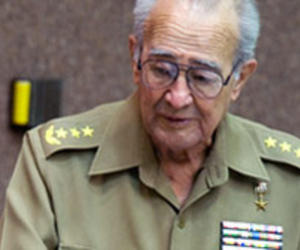Julio Casas, Cuban defense minister and longtime revolutionary, dies of heart failure
- Submitted by: manso
- Editorial Articles
- 09 / 04 / 2011

By Associated Press,HAVANA — Gen. Julio Casas Regueiro, who oversaw the Cuban military’s lucrative economic enterprises for years before replacing Raul Castro as defense minister, died Saturday of heart failure, state television reported. He was 75.
Casas, who was also a vice president of the Council of State, Cuba’s supreme governing body, was the most important figure from the revolution to die since Juan Almeida Bosque in 2009.
State television announced three days of national mourning in his honor, and immediately began playing retrospective footage of his life. It said that Casas’ body was cremated in accordance with his wishes, and that his remains would be placed in the Defense Ministry headquarters on Havana’s Revolution Plaza for public viewing on Monday. A large procession of people was expected to turn out. It was not clear if Raul or Fidel Castro planned to attend.
Casas served under Raul Castro in the rebel army that ultimately pushed out the dictatorship of Fulgencio Batista in early 1959. He was trained as an accountant, a profession that served him well in the Revolutionary Armed Forces, where he ran the military’s financial operations for two decades.
“In the past 50 years I don’t remember ever criticizing comrade Julio Casas, save that, as we Cubans say, he’s very cheap,” Raul joked on Feb. 24, 2008, after he was elected to replace his ailing brother Fidel as president.
Among the first things the younger Castro did in the top job was to name Casas defense minister, the post the new leader had held for nearly a half-century under Fidel. In April, Casas was also elected a member of the Communist Party’s powerful 15-member Politburo, which is led by Raul.
Casas’ financial discipline was the source “of his successes on the economic front, among other activities” in the armed forces, Raul Castro said. Casas also effectively led the ministry in the 19 months that the younger Castro served as Cuba’s interim president after Fidel Castro underwent emergency intestinal surgery and temporarily ceded power.
Born in eastern Cuba on Feb. 18, 1936, Casas was an accountant working in a food warehouse when he joined the rebel forces.
Under Raul Castro’s command in the eastern Sierra Maestra mountains, Casas fought numerous battles against Batista’s troops.
He received additional military training in the Soviet Union and fought in Ethiopia during the years that Cuba sent troops to support African struggles for independence.
Beginning in 1990, Casas ran the Defense Ministry’s Business Administration Group, which includes a host of efficient and profitable enterprises designed to generate the hard currency Cuba has needed to buy critical imports.
One key company imports computers and other electronics. The armed forces also manage a chain of hundreds of small consumer goods stores and a tourism company that runs more than 30 hotels, with subsidiaries that provide domestic tourist travel by air and land. The military also has a large operation producing basic foods for the general population.
The military’s role in the economy has only grown during Raul’s presidency, with trusted generals placed in command of several large state enterprises. In 2010, a military-run company paid some $700 million to buy out Telecom Italia’s stake in state phone company Etecsa, a move that raised eyebrows because it came even as the government complained it was desperately short on funds.
The armed forces are one of the island’s strongest and most respected institutions and historically have been solidly loyal to the Castro brothers.
Source: www.washingtonpost.com/world/americas/
Comments